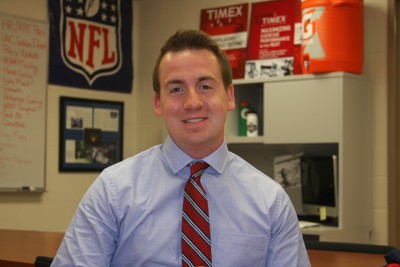
Neag School of Education senior kinesiology student Luke Belval was recognized as a 2013 Undergraduate Research Excellence Fellow from the American Physiological Society (APS). The award targets undergraduate students with significant prior laboratory research experience and encourages students to pursue a career as a research scientist.
Belval, one of six students in the United States to be recognized with this award, will conduct a 10-week research study focused on the effects of fitness on body temperature changes during intense exercise in the heat. Among his study subjects will be runners at the Falmouth (Mass.) Road Race in August.
“It is an amazing honor for Luke to be chosen as an American Physiological Society Undergraduate Research Fellow,” said Dr. Douglas Casa, Belval’s research advisor, kinesiology professor and chief operating officer of UConn’s Korey Stringer Institute (KSI). “Only six people in the country were selected. This is a testament to the dedication Luke has made to push himself to be the best possible researcher. He was selected because he was like a Ph.D. student as an undergrad. He started with us as a senior in high school.”
It was a science project that brought Belval and KSI together. Assigned to research someone working as a scientist or researcher, Belval—a long-distance runner on his school’s track team at Glastonbury High School —decided to reach out the Casa, also a long-distance runner, after reading about him in Runner’s World Magazine.
Sure that Casa would “never in a million years” respond to his request for an interview, Belval was thrilled when Casa invited him to come tour KSI and his research lab. The result was Belval not just successfully completing his science project, but being offered an advanced research mentorship. It gave him an up-close look at the cutting-edge research into ways to prevent athletes’ sudden deaths that the nationally known KSI was performing.
As a UConn undergrad, Belval has stayed involved with KSI, including traveling to Hawaii this past fall to study Ironman triathletes. His future plans include presenting his research findings at the Experimental Biology Meeting of APS in April, as well as pursing master’s and doctorate degrees.
He’s “tremendously” honored, he said, by the APS fellowship: “It comes from such a prestigious organization and is particularly special because it allows me to continue my work at the Korey Stringer Institute with Dr. Casa. I think it’s very rare to be able to work in a place like KSI that not only conducts first-class research, but also applies it to help save lives.”
 Facebook
Facebook
 Twitter
Twitter
 LinkedIn
LinkedIn
